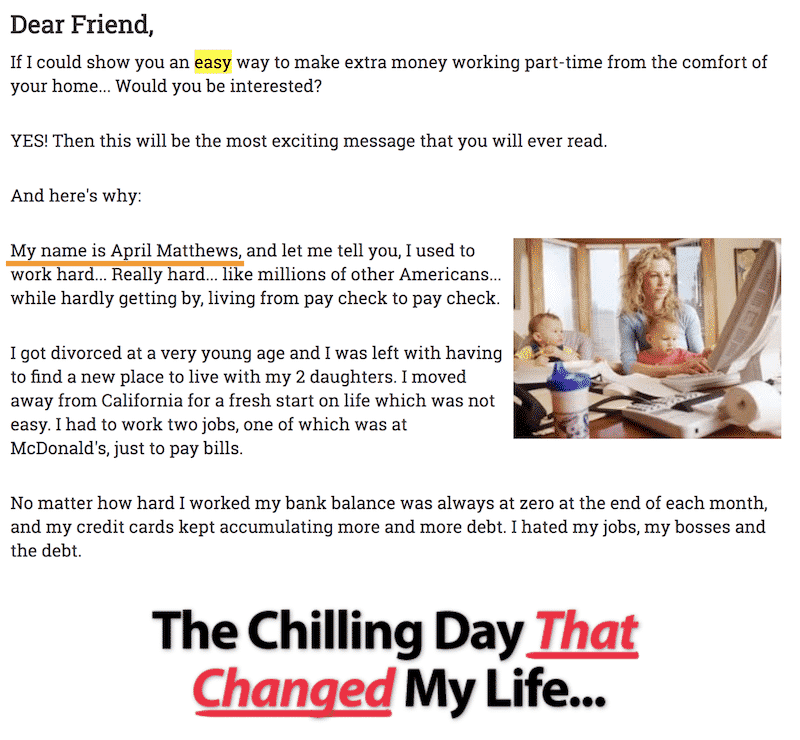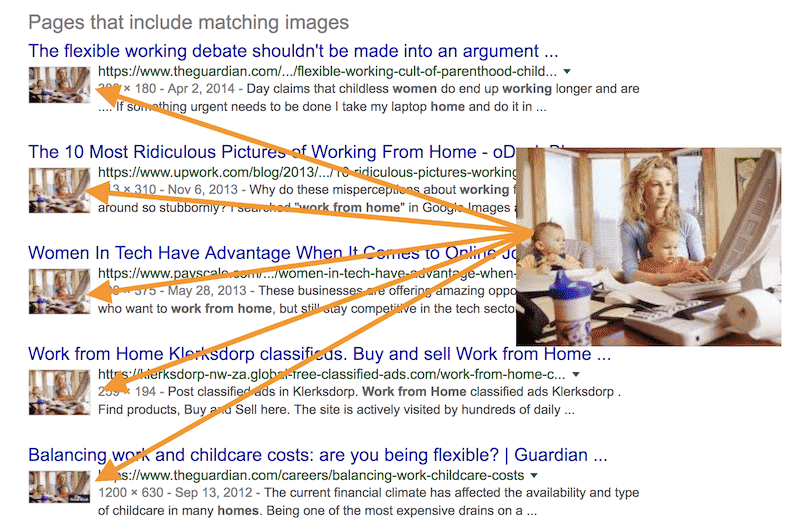Post Links From Home And Make Money
If you're reading this, it means you've probably found a site that says you can make money posting links. As if all you need to do is signup, post a few links and watch the money roll in.
Is it legit? Link posting is not a real job or business model, it's a long running scam that has been ripping people off for years. The sites running these scams claim you can make money just by "posting links on the internet", but the real purpose is selling you a fake work at home program.
I don't expect you to take my word for it though.
So in this article, I'll show you what link posting is about and how these scams work. Then we'll discuss how real people earn money on the internet with a process that involves internet links.
What Is Link Posting?
Link posting is a fake work from home job opportunity.
The sites running these scams tell people they can make money online simply by 'posting links for big companies'. And in the process, earn $100's per day, or $1,000's per month, depending on how many links you post.
Of course, there is a fee to qualify for the 'link posting job' of typically $97. Which is really the first alarm bell, because you should never have to pay to get a job.
In any case, it's only once you pay that fee, that you discover the whole thing is fake.
The job simply does not exist.
And unfortunately, some people fall into the trap of handing these scammers even more money. Because they employ telemarketers to call each member, attempting to convince them to 'upgrade'.
Members are led to believe that if they pay more money, they will get access to the 'real' training and be able to succeed. Which sees some people losing $10,000's.
Without a doubt, this is one of the most prolific and longest running scams on the internet, and one that shows no signs of slowing.
The scam is able to continue running because the people behind it continually close and re-open new versions. Making it impossible for authorities to keep up with every new version.
This also makes it very difficult for people to find honest reviews of these scams.
Because it could be weeks or months before review sites catch up with each new version, and even when they do, it's not long before the scam site shuts down and starts a new version under a new name.
How Link Posting Scams Work
I've reviewed dozens of link posting scams on this site over the years.
Which is how I know they are ALL the same, they are just 'packaged' differently each time. Changing things such as the site name, URL, the fictional character in the story and so forth.
Whatever version you happen to come across, they all sell the same underlying program. And they all operate in the same manner.
So in this section, I'm going to break down each 'stage' of this scam in detail, to show you exactly how it works.
Stage 1 – Opting In
Most link posting scams start off with a 'squeeze page' like this…

The majority of people are invited to these optin pages by a SPAM email or advertisement somewhere online.
In any case, once you land on this page, you need to provide your name, email and in some cases, your phone number in order to proceed.
The purpose of this stage is to get your information, so that even if you don't join, they can SPAM you. And sell your information to other unethical marketers for a profit, who will then do the same thing.
Once you click through to the next page you will often be told that "your spot is being secured" or something to that effect. This is to create a false sense of urgency and exclusivity.
Stage 2 – The Sales Page
The sales page is where the major red flags pop up.
This page often begins with a headline claiming that "in just 60 minutes per day" you can start earning over $300 per day from home.

The page then goes on to say that "this work from home job has been getting a lot of media attention lately". Followed by a (generic) work from home news video.
The remainder of the page is all about a woman and her 'rags to riches' story. And apparently, link posting made her wealthy, so now she's sharing her secret with you.
The whole story is very convincing and has all kinds of emotional triggers to take people from visitor to buyer. It must be quite effective, because the same sales copy has been used for many years.
Anyway, the program itself costs $97 in most cases. And if you do buy, this is where you figure out you've been scammed.
Stage 3 – Disappointment and Upsells
If you do buy into this, you will get access to the members area.
This consists of some generic, outdated training on affiliate marketing, which is where you earn money promoting other people's products.
Affiliate marketing is absolutely legit in and of itself. But first of all it's a business (not a job) and second, this site does NOT teach you how to be successful this way.
Given the low quality of the training and complete lack of support, most people are thoroughly confused as to what the heck they are meant to be doing.
There's no job and no tangible instructions on how to build a real online business. Period.
And this is why everyone who joins is encouraged to 'call their coach'. Who in reality is a pushy telemarketer, who's sole objective is getting you to buy more stuff.
The most alarming part about this is that any money spent over the phone is almost impossible to get back. So those who fall for this lose out for good.
Stage 4 – Bring on the Never Ending SPAM
Regardless of whether you buy or not, your information is sold to third party marketers.
This is disclosed within the fine print of almost all of these sites. And it basically says you agree to receive SPAM emails, text messages and even direct mail on a daily basis from these people.
I am not kidding, read the privacy policy page on ANY of these sites carefully!
The most annoying thing about this SPAM is that once your email is sold and shared in this manner, the spamming is virtually impossible to stop.
And that's how this scam works in a nutshell.
As you can see, at no point are you making money or given a real home based job. The whole thing is an elaborate way to make money at your expense.
4 Major Red Flags To Watch For
Now that you know how this scam works, I think you will benefit by understanding some of the most COMMON tactics these scammers use to convince people to buy.
This way, you will know what to look out for next time. Knowing the stuff I am about to share with you can help you avoid all kinds of internet scams.
1- Scraped News Videos and Logos
Every link posting site I've come across pretends that the 'job offer' is attracting lots of media attention. This is why you will see news logos and generic news clips about working from home.
What most people don't know, is that they are literally copying and pasting those logos without permission and embedding OLD generic news clips like this one…
This is THE most common news clip I've seen them use and it is practically the hallmark of a link posting scam.
If you watch the above video, you will notice that the name of the program is NEVER mentioned. And that's because legitimate news networks are not endorsing these programs at all.
2- Fake Alias' and Back Story
All of these sites use a fake persona and a fake story to lure you in.
Often the story is about a 'struggling single mother' who lost her job. And then one day, she "had a chilling day that changed her life".
Apparently, she met a man in a doctor's office who showed her how to do link posting. And now that she's rich, she teaches others how to do the same thing.
That's about the gist of it, and it's all 100% BS.
How do I know?
Well for starters, they only ever use stock photos. For example, in one version of this scam called My Home Success Plan, the woman is known as 'April Matthews'.
Here's a screenshot I took of that site:

Now here she is as a stock photo…

I guess you could reason that the story itself could still be real though, right? Well not when you see how many times that SAME story has been told by countless other alias'.
For example, in one site called WAH Program they use the same story but attach it to a different alias, Bobbie Robinson. While in other versions it's Karen Johnson, Kelly Simmons, Linda Wilson.. on and on it goes.
Here's some examples to show you what I mean:
Other common alias' I've found are Kelly Simmons and Heather Smith. But honestly, the list just goes on and on… and on.
3- Fake Testimonials
Along with fake personas, they also use fake testimonials.
This is VERY common among almost every online scam I see. The people running these sites KNOW that you are much more likely to buy if it appears as though others are making money with the program.
The trouble is, real people are not making money with this. So they need to use more stock photos and fake stories to convince you the whole thing is real.
If you see enough of these sites as I have, you will see what I mean. The stories are always the same and if you do a reverse image search, you will see that the images are just stock photos as well.
4- Fake Scarcity (buy now or you'll miss out!)
It's no secret that many people buy on impulse. I do it myself and chances are you've done it at some point too. We all have.
It's a fact of life, and these scammers are capitalizing on it.
Throughout every page of these sites, you will see fake countdown timers and mentions of 'limited spots'. The idea is to convince you that "time is running out" so that you buy on impulse, without doing your homework.

The fact is that there is NOTHING limited about these offers at all. Except maybe that soon they will shut that version of the scam down and open a new one.
In any case, this is a common and unethical marketing tactic known as 'fake scarcity'. Which is making something appear limited when it is not.
Unfortunately, it works.
This is why I always recommend being cautious of any program trying to convince you to make snap decisions.
Who's Running These Scams?
Good question!
I have no idea who started this scam and to be honest I don't think anyone does. Because every site uses an anonymous domain, fake alias' and nothing that points to the real people behind it.
However, I did manage to find some information from the FTC website regarding this scam. And I explain what I found in detail within my review of Home Job Placement (which is yet another link posting scam site).
In short, the FTC caught up with the people running these scams and found they ripped consumers off for well over $100 million dollars.
Here's the source of that information if you want to learn more:
- 2011 FTC press release
- 2014 FTC press release
Whoever these people are, they know what they are doing and they have made it their mission to scam people.
Why Link Posting Is NOT a Real Thing
To underscore just how fake link posting is, let's consider what these sites actually claim.
They claim that anyone can qualify to instantly begin making money as a 'link posting agent'. They also use other names for this such as 'search engine agent', as if this is some sort of Google based work from home job.
Anyway, they even provide an income calculator to work out how much money you can make…

According to this calculator, you can start making over $300 per day from day 1 (the calculator above isn't even on the highest setting).
Ask yourself, why on earth would ANY company pay over $6k per month, for a job that ANYONE can do.
After all, it's apparently so simple that you don't need any skills.
So why wouldn't these companies outsource such menial work to lesser developed countries, where the minimum wage is significantly lower?
They would and they do. And either way, real companies don't hire people to post links, because it's not a real job description.
Affiliate Marketing- The Real Way to Earn Money Using Links
If you analyze the sales material, what you will find is that these people are really selling you on affiliate marketing. Except they are GROSSLY misrepresenting what affiliate marketing is all about and how it really works.
Yes, you can technically make money by posting a link. Just like you can technically make money by posting ads online. But there is a LOT more to how this works, it is absolutely NOT that simple.
I know this because I earn a full-time income with affiliate marketing.
In a nutshell, affiliate marketing is a legitimate business model where you earn money promoting other people's products or services online.
The process takes time and effort, but it is relatively simple…
You choose a niche, build a website, get traffic and promote affiliate products on your site. The way you promote products is by joining a free affiliate program, who provides you with your own unique 'affiliate links'. So that when people click on your link and buy something, you earn a commission.
Everything is tracked automatically, so you just need to focus on getting the right people to click on your affiliate links.
Anyway, the way these sites explain the process is nothing short of ridiculous. They reduce the ENTIRE process down to 'link posting' and make it sound like some sort of job. Which it most certainly isn't.
Affiliate marketing is a business. One that takes time and effort to get profitable. You certainly do NOT get paid per link you post and you need to have traffic if you want to get people to click on your affiliate links.
You can't just expect to SPAM social media and other sites to get people clicking on your links. Which is essentially what these scam sites tell you to do.
Conclusion
If you've read this far, well done. I went into a lot of detail in this post, because I really wanted to show you what this scam is and how it really works.
Link posting scams are one of the most prolific and long running scams the internet has ever seen. Which is why it's so important to arm yourself with the right knowledge, so that you can avoid stuff like this in future.
If you want to be successful online, it takes time and effort. There is no shortcut and you will not start making money right away. This is simply not the reality.
The only people making money by 'posting links' are those who do so at your expense.
Post Links From Home And Make Money
Source: https://affiliateunguru.com/link-posting
Posted by: mcgrawvithembity.blogspot.com

0 Response to "Post Links From Home And Make Money"
Post a Comment